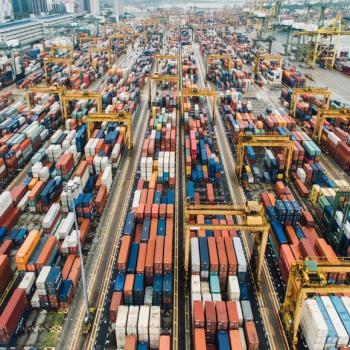More of our “correspondent on the spot” at Acton University! Follow the Twitter feed from the conference here and read his first three posts here:
The third lecture of the day, Jennifer Roback Morse’s presentation of economic theory, moved into territory with which I’m less familiar than with the philosophical and political issues discussed by Gregg and Miller. One of the many reasons I jumped at the opportunity to attend Acton University was that I am very ignorant of economic matters and need to remedy that. Morse’s presentation was, like those of her colleagues, both substantive and entertaining. In fact, she probably had the most engaging style of any of the foundation presenters, though that’s a hard call because they were all very good. According to Morse, the basic principles of economics are that
- There is a truth to be discovered
- There is such a thing as human nature; and
- People respond predictably to incentives.
She suggested that the first two principles are accepted by orthodox Christians and by economists, but not by most others in our society. Hence, at this level there is a basic affinity between Christianity and economic theory. I’m not sure about this myself, and I think that the third principle demonstrates the problems with her claim. Doesn’t the view that people respond predictably to incentives threaten the Christian doctrine of free will? (Well, unless you go with Jonathan Edwards’ doctrine of the will–and I’m going to go out on a limb and say that I don’t think Edwards is entirely orthodox on that point.)
Isn’t the “human nature” posited by economics something fundamentally mechanistic and soulless, a rational maximizing of benefits and minimizing of costs that leaves little room for what makes human behavior interesting and (sometimes) beautiful?
Morse then proceeded to a basic definition of capitalism, citing John Paul II’s distinction in Centesimus Annus between capitalism as a basically free economy founded on voluntary exchange, and capitalism as a free economy unconstrained by a “juridical” framework based on moral principles. In other words, from Morse’s perspective the capitalism worth defending is not unregulated capitalism but a capitalism set firmly within a moral framework, with plenty of room for governmental and other limits when those are clearly necessary to the common good.
Morse drove home this distinction by suggesting that whereas Acton had originally been founded in opposition to liberation theology, in recent years Ayn-Rand-style libertarianism has become an equal threat. She thus positioned Acton’s ideology as the “golden mean” between leftism and Randian libertarianism. I found her willingness to call out “the threat from the right” refreshing and cheering. The “Acton synthesis,” as she presents it, is “the basic market framework, constrained and limited by Christian virtue.” That’s a formula I can support, even if I might have some different ideas about what that “constraining and limiting” should look like.
Based on this core definition, she then raised three questions:
- Does the scale of enterprise matter, in and of itself?
- Do we care about inequality per se? Is defending the weak a better principle?
- Suppose we agree that the government has some role to play in creating the juridical framework Pope St. John Paul describes. How can we marry our good intentions with sound policy?
I think these are all excellent questions. My tentative answers at this point would be
- The bigger the scale of the enterprise, generally the more room there is for abuse. So it matters, but that’s not to say that large-scale enterprises (or large political entities) are inherently bad. Just that our willingness to be critical and ask tough questions about an institution should increase in proportion to its scale.
- Yes, I think defending the weak is a better way to put it. But I don’t think this is an either/or. Inequality, in the senses in which I’ve seen people complain about it, is very much about an inequality of power in one way or another. Hence, to defend the weak is to be concerned about inequality.
- This one I’m very much still working on, and have much to learn from the speakers at Acton University.
Morse then distinguished helpfully between two different ways of looking at economics. The definition most often presented in introductory courses is that economics is the study of scarcity–how to allocate scarce resources in the face of infinite demands. But, she suggested, an alternative way to look at it is as the study of exchange of all kinds. (This was one of several times so far that something a speaker has said has reminded me of Charles Williams’ wonderful poem “Bors to Elaine: On the King’s Coins”–”money is a medium of exchange.”)
The rest of Morse’s talk was a summary of the basic principles that govern the free market. I’ll just mention a few points I found illuminating. One was the importance of “non-monetary costs.” The obvious basic principle of free exchange is that the buyer will have an incentive to pay as little as possible and the seller to get as much as possible. But Morse pointed out that this calculation includes more than just money. It includes, for instance, “opportunity cost”–what the participants could be doing other than buying or selling. (This has been a serious consideration for me this summer in deciding whether or not to take my produce to a farmers’ market. I could probably make enough to cover the basic fees charged by the markets in my area and still make a modest profit. But attendance at a farmers’ market would wipe out my Saturday morning and early afternoon, and/or another day in the week as well depending on which market I was attending. And that is a more serious deterrent than the financial overhead involved.)
Click for more on possible problems with free-market economics!













